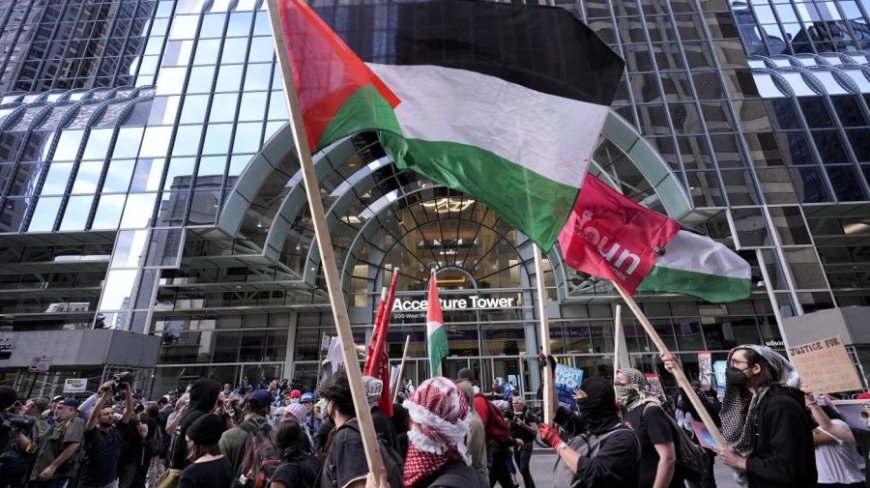Harris remarks, DNC snub leave pro-Palestinian activists fuming
Vice President Harris sought to give voice to the suffering in Gaza during her presidential nomination acceptance speech at the Democratic National Convention, but many pro-Palestinian activists were still left fuming after the Chicago event. Israel-Hamas war protesters wanted a more direct condemnation of the conflict from Harris and a more nuanced perspective than President...

Vice President Harris sought to give voice to the suffering in Gaza during her presidential nomination acceptance speech at the Democratic National Convention, but many pro-Palestinian activists were still left fuming after the Chicago event.
Israel-Hamas war protesters wanted a more direct condemnation of the conflict from Harris and a more nuanced perspective than President Biden has offered, even if they assumed they wouldn’t get a call for an unconditional end to the fighting or an arms embargo on Israel.
“There’s no shift from Biden. The messenger has changed, but the message hasn't changed,” Daniel Engelhart, an uncommitted delegate from Minnesota, told The Hill. “Clearly, there's no policy shift or change of direction.”
The uncommitted delegates and their pro-Palestinian allies were deeply angered by the denial of a Palestinian American speaker at the convention, a controversy that likely ensures Democrats will continue to navigate a rocky path on the Israel-Hamas war through Election Day.
Some pro-Palestinians were especially upset by the rejection of a speaker because the parents of an American hostage held by Hamas were given time for a speech at the DNC.
The Uncommitted National Movement had 30 elected uncommitted delegates at the convention after some 700,000 Americans voted against Biden in the primaries, before he dropped out and endorsed his vice president.
During her speech, Harris vowed to always defend Israel against terrorist attacks, calling out Hamas for the deadly Oct. 7 attacks that killed some 1,200 people and took roughly 250 hostages in southern Israel, while also expressing her concern about the toll in Gaza, where more than 40,000 people have died.
“What has happened in Gaza over the past 10 months is devastating,” she said to a round of applause. “The scale of suffering is heartbreaking. President Biden and I are working to end this war such that Israel is secure, the hostages are released, the suffering in Gaza ends and the Palestinian people can realize their right to dignity, security and freedom to self-determination.”
Engelhart hit back at Harris’s suggestion that the administration was working toward self-determination in Gaza, given its ongoing support for Israel’s military.
“For people to have rights and any sort of self-determination, they have got to stop sending the fire,” he said. “Cease-fire has to have meaning. It has become a meaningless word.”
Layla Elabed, the co-leader of the Uncommitted National Movement, told The Hill that Harris’s speech did not reflect the “majority of her core base” and would hurt her during the election.
“She will have to reason with the fact that the majority of the core base that she needs to mobilize to vote for her in November, her current policy doesn't align with them,” Elabed said. “This was one of the reasons why President Biden had to exit from the presidential race, was because of his unpopular and immoral policy, and right now, we're not seeing anything different.”
Still, many Democrats supported how she addressed the war. Sen. Jeanne Shaheen (D-N.H.) said Harris “struck just the right balance” on Gaza in the speech.
“She made a very important statement about support for Israel and the right of Israel to defend itself, about the terrorism from Hamas and the horrible events of Oct. 7,” she told CNN on Friday.
“But then she pivoted, and she talked about the need for a cease-fire, and the need to ensure that the Palestinian people get the support they need and have the right to self-determination ultimately.”
Leaders of the movement were negotiating with Harris and the Democratic convention to allow a Palestinian American to speak during the event. Harris refused, and uncommitted organizers began a sit-in.
Even more than her speech, pro-Palestinian activists said the refusal to get a Palestinian American on the stage signaled a political resistance to openly standing up for Palestine.
Khaled Elgindy, a senior fellow at the Middle East Institute who leads the think tank’s research on Palestinian issues, said it was “jarring” that there are Democratic “people in leadership who believe that expression of humanity is a political liability.”
“That is what really hit people hard,” he said, adding those who were “cautiously optimistic about Kamala Harris now feel deflated and erased.”
Jim Zogby, director of the Arab American Institute, who hosted the first-ever Democratic convention panel on Palestinian human rights during the Chicago convention, called the decision a “boneheaded move” and an “unforced error.”
“I think they made a mistake by not having a Palestinian speaker,” he said. “They may end up making it difficult for some people to vote because they didn't have a Palestinian speaker.”
Gaza remains the most divisive issue in the Democratic Party, and the conflict stood in stark contrast to the wave of enthusiasm for Harris throughout the convention. Thousands of protesters gathered in Chicago to protest Democratic support for Israel’s war in Gaza.
Harris’s speech was closely watched, especially among those who were hoping she would continue to lay down a harder line than Biden following her vow to “not be silent” after meeting with Israeli Prime Minister Benjamin Netanyahu last month.
Hudhayfah Ahmad, spokesperson and head of media for the Abandon Biden movement, a pro-Palestinian organization that had called for voters to not support Biden unless he ended support for Israel, said his group would now switch to Abandon Harris.
“She ended up proving Abandon Biden correct and now there is no doubt that she will not be different than Joe Biden,” he said. “The time has come for us to be … committed towards holding the Democrats accountable for the genocide. The carrot has not worked. Now it's time for the stick.”
Harris on Thursday did push for a cease-fire and hostage release deal, which the Biden administration has been working on for months. That deal, however, appears to have fallen through as Israel and Hamas remain at odds on how to establish a cease-fire and exchange hostages and prisoners. Biden has been accused by pro-Palestinian supporters of not using his leverage, including by withholding weapons, over Israel to secure a deal.
Council on American-Islamic Relations board member Edward Mitchell Abraham said he saw a distinction between the current president and his potential successor. He said Harris did “an admirable job of speaking about Palestinian suffering in a far more human way than other Biden administration officials.”
But he said Harris must do more, and he slammed the convention for not allowing a Palestinian to speak.
“The DNC's refusal to let a single Palestinian-American to speak at the convention has caused significant concern and outrage among voters who want to support her candidacy,” Abraham told The Hill. “So has her campaign's failure to indicate that she would enforce U.S. laws forbidding arms transfers to the Israeli government and other human rights violators. Concerned voters need new policies and concrete action, not just improved rhetoric."
Zogby, who helped found the Palestine Human Rights Campaign in the 1970s, said the “Israel language was over the top" in the speech.
“Given the circumstances of what's unfolding on the ground, I thought, ‘God, I wish she hadn't said that,’” he said, “but the Gaza language was something no one has ever said in that way and with that much passion, and so I was moved.”
Zogby added that the “real fight” is getting Harris to agree to policy changes, “and that will only come if she wins and becomes president and can change policy.”
What's Your Reaction?





















































